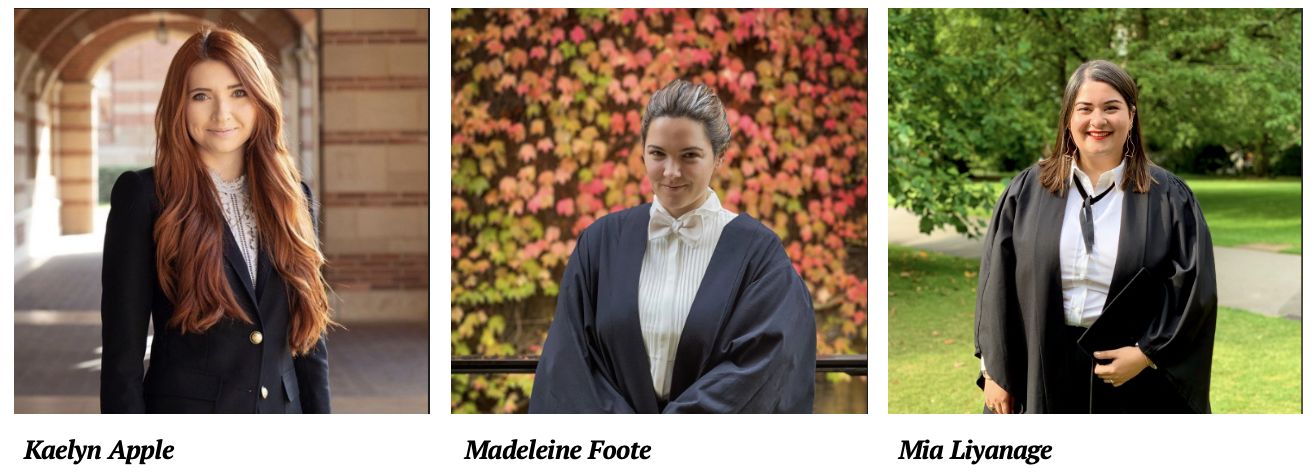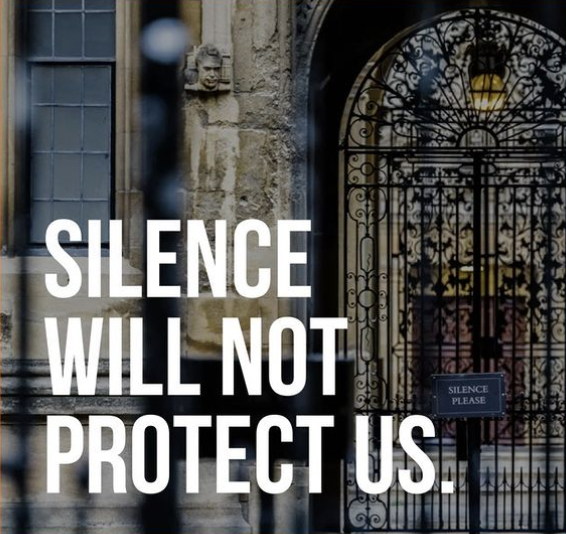CW: Sexual assault
Led by (ex-)Oxford undergraduates and current graduate students across six faculties and sixteen colleges, the new collective aims to both be a space to support survivors and a movement that prevents further sexual violence. They are perhaps best known to Oxford students through their instagram account “@transformingsilence”, which has accumulated 800 followers in a matter of weeks. In a wide-ranging conversation, Cherwell spoke to some of the key students involved with the movement.
Madeleine Foote (1st year DPhil in History, St Antony’s), Mary Newman (1st year DPhil in Medieval & Modern Languages, Trinity), Mia Liyanage (Balliol student 2016-2019, one of the original complainants that sparked the Al-Jazeera investigation) and Lara Scheibli (PPE graduate, Women’s Rep at the Philosophy department) all met through what they called Oxford’s “whisper network” in the wake of the fall-out from the Degrees of Abuse investigation. Kaelyn Apple, another of the key complainants in the al-Jazeera investigation, is also involved in the group, but could not attend the meeting.
Mary told Cherwell that: “I simply tweeted, as Academic Twitter and Oxford Twitter blew up, how can I help, and I met Madeleine”. Madeleine, who had matriculated in 2011, had recently returned to pursue a Dphil. To her horror, Peter Thompson, one of the key focuses of the al-Jazeera report, was the same Fellow she had heard rumors about a decade earlier. When the investigation broke, she too decided that it was time to act.

Linking up with other survivors and activists via acquaintances, social media and other channels, they soon decided to form an egalitarian collective which would both provide an effective support group to help victims achieve justice and prevent further sexual violence from happening. Madeleine: “In the decade I was gone, the world changed. MeToo happened. And when I came back, it was clear MeToo hadn’t happened here, at the University of Oxford”.
Towards the end of Michaelmas, they started to get together. The decisions was made to launch a staff-student symposium and produce a report on sexual violence before the end of Hilary Term. The tight time-frame, they say, was intentional. In their experience, the long vacation over summer leads to a loss of momentum and more inertia.
The name of the symposium – Silence will not protect us – is a deliberate homage to Audre Lorde’s Your Silence Will Not Protect You. In it, Lorde deals with the relationship between language, action and violence. But, the group says, they want to make clear that “this is not a staff-versus-student issue. This is one of solidarity and support.” They went on to clarify that “our work is as much aimed at staff as at students. Over half of those who have expressed interest to attend our conference are staff”. The projected line-up for the event includes Professor Sundari Anitha, Dr Anna Bull, Professor Deborah Cameron, Professor Elizabeth Frazer, Dr Mara Keire and Professor Alison Phipps.
Madeleine clarified that their criticisms of the process boiled down to three key issues. These were transparency (“the University does not provide centralised statistics on sexual violence, and many colleges ignored our FOIs”), individualisation (“there seems to be no willingness to look at broader patterns rather than a simple case-by-case approach”) and a lack of clarity in terms of who was responsible. “Every time it’s different processes, with different rules and demands. Sometimes it is the discretion of the department, sometimes the University and often it is just the college that is responsible. This can be incredibly hard for victims to navigate”
Their calls for change went beyond the process that kicks in motion after a sexual assault is reported. They want to see changes in what is considerdered inappropriate, nothing that, according to their own research, only one UK University (UCL) completely bans staff-student relationships. After being prompted by Cherwell whether this meant that they, too, sought to forbid those types of relationships, the group answered affirmatively.
Towards the end of the conversation, Cherwell asked how they personally had experienced the past few weeks.
“The most common response to our work has been surprise. Most students and staff don’t know that Oxford has the highest number of staff-on-student and staff-on-staff allegations of sexual misconduct.
“Most do not know that only four colleges (Linacre, Oriel, Regent’s Park, St Hugh’s) ban professors from pursing romantic and sexual relationships with students.
“Most do not know that even if a student files a formal complaint of sexual misconduct against a member of staff, almost no college has a policy that obligates them to investigate before dismissing the complaint
”After surprise, the next response is anger. And usually, after people get angry, they are ready to do something”
In a reply to Cherwell, the University said that:
“Oxford remains fully committed to ensuring that all students and staff are safe during their time here and takes any allegation of sexual misconduct extremely seriously. Any student bringing forward complaints of this nature will always be listened to and supported.
“The University does not hold information where incidents are dealt with by individual colleges and does not comment on individual cases.
“Students are advised on their options, including how to make a complaint, and offered a number of support services by the University.
“We have already put a wide range of measures in place aimed at educating students, supporting those affected and preventing further incidents and continue to expand the support services available, both at university and college level. These include the establishment of the Sexual Harassment and Violence Support Service, and a high profile university-wide campaign, Oxford Against Sexual Violence. Oxford was the first university to engage a dedicated Independent Sexual Violence Advisor (ISVA), seconded from the local Rape Crisis centre who is based within the Sexual Harassment and Violence Support Service, and a specialist investigator in the Proctors’ Office. “
The symposium Silence Will Not Protect Us is expected to be held on the 25th of February.
When approached for comment, the University of Oxford said, “Oxford remains fully committed to ensuring that all students and staff are safe during their time here and takes any allegation of sexual misconduct extremely seriously. Any student bringing forward complaints of this nature will always be listened to and supported.”
“The University does not hold information where incidents are dealt with by individual colleges and does not comment on individual cases.”
“Students are advised on their options, including how to make a complaint, and offered a number of support services by the University. We have already put a wide range of measures in place aimed at educating students, supporting those affected and preventing further incidents and continue to expand the support services available, both at university and college level. These include the establishment of the Sexual Harassment and Violence Support Service, and a high profile university-wide campaign, Oxford Against Sexual Violence. Oxford was the first university to engage a dedicated Independent Sexual Violence Advisor (ISVA), seconded from the local Rape Crisis centre who is based within the Sexual Harassment and Violence Support Service, and a specialist investigator in the Proctors’ Office.”
“As a university, we work closely with partners across the city, including Thames Valley Police, and encourage anyone affected by these very serious issues to report them to the police.”
Image Credit: @transformingsilence and Kaelyn Apple, Madeleine Foote and Mia Liyanage



